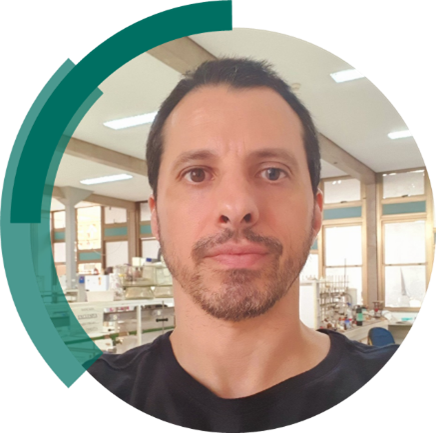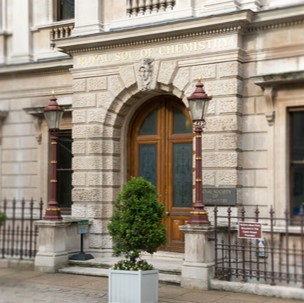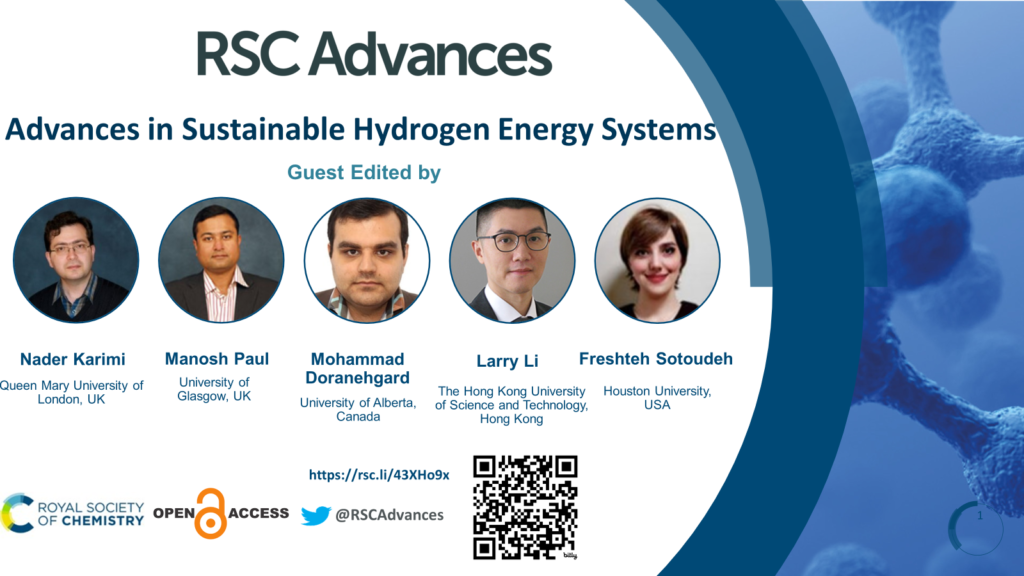Interviews with Associate Editors
Our Associate Editors offer some Advice
At RSC Advances we have a team of around sixty-five hard working Associate Editors, who handle your manuscript, from initial assessment to their final decision. They are active researchers and experts in their respective fields, and therefore have an in-depth understanding of what it takes to get work published.
To gain more insight into the world of peer-review, we have asked our Associate Editors two questions:
- What are the most important points for a reviewer to include and discuss to help guide your decision?
- When you act as a reviewer, how do you approach this task and what are the initial steps that you take when assessing a manuscript?
Here are what our Associate Editors Dr Donna Arnold, Professor Brenno Neto, Professor Beatriz Jurado Sánchez and Professor Rodrigo Octavio de Souza had to say:

Dr Donna Arnold, University of Kent, UK
What are the most important points for a reviewer to include and discuss to help guide your decision?
One of the most important things is to provide evidence for the recommendations you are making. This is crucial to be able to make an effective decision. It is not particularly useful if the decision of the reviewer, for example, is reject but there is no information to qualify why this is the case. Another important consideration is that the review is based on the science presented in the manuscript. I have seen some reviews which are limited to ” not well written”. I know sometimes this does make it hard to read or to interpret the science, but it is better to state something like “the conclusions are not particularly clear” as this is more useful to both the editors and the authors.
When you act as a reviewer, how do you approach this task and what are the initial steps that you take when assessing a manuscript?
I first read through the manuscript and make myself some notes on queries I have. I then develop this into a report with a reread of the manuscript. I think it is really important to remember that there are often early career researchers at the end of this process, I then go through my comments to make sure that the tone of the review is correct. I have seen firsthand the damage a flippant or aggressive review can do to someone early in their career. This is not useful for anyone. I think it is easy as a reviewer to sometimes become frustrated when we receive something which we perceive to not be of high enough quality. Peer review is an important part of the process and as such we should continually remind ourselves of this and act accordingly. If I have a particularly tough review, I will sometimes sit on it for a couple of days and come back and make sure that my review is fair and that I have not poured frustrations from something else into my review. Lastly, I always try to ensure that my criticisms are constructive and that I provide clear guidelines for how the manuscript might be improved even if my decision is reject.
Other comments
Some final comments on a good review. We have all been invited to review because we have expertise in the field. This is an honour and reflection of our own standing. It is not an opportunity to push up our own metrics and citations. Sometimes it is necessary to point authors to some work that they may have missed. In this case we should make sure as reviewers that we provide a balanced list of potential papers and not just our own. Also just providing a long list of our own references to be included in a manuscript compromises the anonymity of the review process!

Professor Brenno Neto, Universidade de Brasilia, Brazil
What are the most important points for a reviewer to include and discuss to help guide your decision?
A well-written report must be concise, precise, balanced, and fair. It should address critical aspects, such as the scientific quality, advancements in the subject matter of the submitted work, and its potential impact. This may seem simple to do, but in reality, it can be a truly challenging task sometimes. Politeness is paramount, even when evaluating what might be considered the worst submitted manuscript. It is essential to assess the quality of conducted experiments, ensure that all necessary analyses have been performed, verify the accuracy of characterizations, and the purity of molecules/materials used in the study. Lastly, state whether the work is poised to make a significant contribution to the field and if the scientific content has been presented in the best possible way. By providing constructive criticism and highlighting the strengths and weaknesses of the submission, the reviewer can help authors improve their work and significantly contribute to the editor’s decision.
When you act as a reviewer, how do you approach this task and what are the initial steps that you take when assessing a manuscript?
In the role of a reviewer, I first check the experimental procedure in detail and the provided characterizations. If the manuscript checks these two essential items, I will know that the science it contains is trustworthy. Otherwise, why should I go further?
I always try to provide a balanced and fair report by treating the manuscript submitted as I wish all of my own were. A well-written manuscript, with well-constructed figures and schemes, always makes a good impression. If it has a piece of well-built supporting information, it adds positively to my overall impression of the work. You may wish to check some important tips . If some experiment, reference, or discussion is missing, I will indicate it. I try to remember that my role as a reviewer, at first instance, is to help authors, but not to be their harsh critic, like “reviewer #2” is seen in many scientific jokes and memes.
Considering that the submitted work has checked for these important aspects and assuming it has been submitted to the correct forum, I will be glad to recommend your manuscript for publication, regardless of whether major or minor revisions are suggested.

Professor Beatriz Jurado Sánchez, University of Alcalá, Spain
What are the most important points for a reviewer to include and discuss to help guide your decision?
A balance and detailed report discussing the novelty and key points that justify publication, as well as any experimental issues. My preferred structure is: 1. A main paragraph describing the novelty and key points that justify (or not) publication and fit for the journal, as well as the clear recommendation to accept, reject, major revision, etc. As an editor, we are an expert in the field but not the best expert on a very specific topic not close to our research line. 2. Major comments, in bullet points (for example missing experiments, missing citations, novelty issues) and 3. Minor comments (normally, spelling mistakes, figure display, etc). Another key point is that your report is in line with the default options to select when you send the template (if you recommend minor revision, please select minor revision). And last, but not least, be professional and constructive, especially in rejection or when requesting extensive additional experiments, justifying it with appropriate references.
When you act as a reviewer, how do you approach this task and what are the initial steps that you take when assessing a manuscript?
As a reviewer, I like to provide my report as specified in the previous points. When I review an article, I read the title, the aims at the end of the introduction (to see the match) and the figures. In the figures I check appropriate material characterization, error bars, adequate captions, etc. Then, I read the full article and annotate on a separate sheet of paper potential doubts, errors, etc. Next, I check for similar literature to detect novelty issues, etc. After this, I elaborate my report and read it carefully. I always try to be supportive, even in the event of rejection, so the authors can improve the manuscript.
Tips and tricks
- Do not accept the reviewer invitation if you are very busy.
- Make sure that the topic fits in line with your research or at least is familiar to you.
- Be constructive and support the authors, even in the event of rejection. We are all authors of scientific articles!
- Structure your report: Main general comments (novelty!), major comments, minor comments.
- Provide appropriate references and evidence.
- Enjoy! Reviewing is a (unpaid) job, but you are learning new scientific discoveries and progress. Most importantly, you are supporting the scientific community!

Professor Rodrigo Octavio de Souza, Federal University of Rio de Janeiro, Brazil
What are the most important points for a reviewer to include and discuss to help guide your decision?
When searching for reviewers, I typically seek individuals who possess greater familiarity with the specific topic to which the article belongs. Therefore, a reviewer should initially provide a concise summary of the proposal presented by the authors and subsequently demonstrate to the Editor how that work fits within the existing literature, highlighting the major contributions made by the research group. Identifying whether the work builds upon previously published manuscripts is a crucial factor as it aids in the interpretation and determination of the expected impact of that contribution. Additionally, it is of great importance to the editors that the reviewers can interpret the data presented by the authors and, whenever possible, offer an alternative perspective to what is being presented, either through direct questions or comments.
When you act as a reviewer, how do you approach this task and what are the initial steps that you take when assessing a manuscript?
Particularly, I endeavour to divide the reading of a manuscript under review into three parts. The initial reading aims to comprehend the contributions offered by the team of researchers and the potential impact they may have on the literature. Subsequently, a more thorough examination is conducted, seeking a deeper understanding of the results and the necessary information to fully grasp the work. After these two readings, I usually feel sufficiently informed to make a decision regarding the acceptance or rejection of the manuscript. The choice between minor and major revisions, in my case, only occurs once the evaluation is completely elaborated.
The conclusion of the evaluation generally takes place after a third reading, which I employ as a revision. To format the evaluation and deliver it to the responsible editor, I initially provide a concise summary of the main discoveries presented by the author and attempt, to the best of my ability, to establish connections with the existing literature on that specific topic. In a second phase, I present my considerations regarding the significance of the article, assess whether the employed methods are appropriate, and subsequently determine if the conclusions are supported by the obtained results. Lastly, I incorporate questions that should be included in the manuscript to enhance the presented outcome and highlight necessary corrections.
The central point that I consistently emphasize is that we must judge a work based on what has been presented to us, rather than our personal preferences for its content.
We hope you have found this post useful. Tune in next Wednesday to catch the next instalment of Advancing with Advances: perfecting peer review. Next week, more of our Associate Editors will provide their insight into reviewer reports.
Don’t miss out on our additional posts on perfecting peer review below:
- Why should I write a report? Our in-house editors will provide guidance on the importance of peer review, why you may consider being a reviewer for a peer reviewed journal, and how to approach you reviewer report.
- Expected reports from external reviewers: An introduction by Professor N. Mariano Correa, who will use his experiences to highlight what a reviewer report should cover.
- Interviews with Associate Editors: Our experienced team of Associate Editors from a broad range of subject areas will provide insights into how they use your reviewer reports, and what aspects they find the most useful in making a decision on a manuscript.
- Part 4 – Featuring Dr Donna Arnold (University of Kent), Professor Brenno Neto (Universidade de Brasilia), Professor Beatriz Jurado Sánchez (University of Alcalá) and Professor Rodrigo Octavio de Souza (Federal University of Rio de Janeiro)
- Part 5 – Featuring Dr Giacomo Saielli (University of Padova), Professor Shivani Bhardwaj Mishra (University of South Africa) and Professor Leyong Wang (Nanjing University)
- Part 6 – Featuring 10 Associate Editors
You are welcome to send in any questions you have about peer review or publishing with RSC Advances to advances-rsc@rsc.org or post them on X @RSCAdvances #AdvancingWithAdvances.

Check out more publishing tips and tricks from our Advancing with Advances: how to publish and not perish series!
RSC Advances looks forward to advancing the chemical sciences with you.
Comments Off on Advancing with Advances (series 2): Perfecting Peer Review (part 4)


























